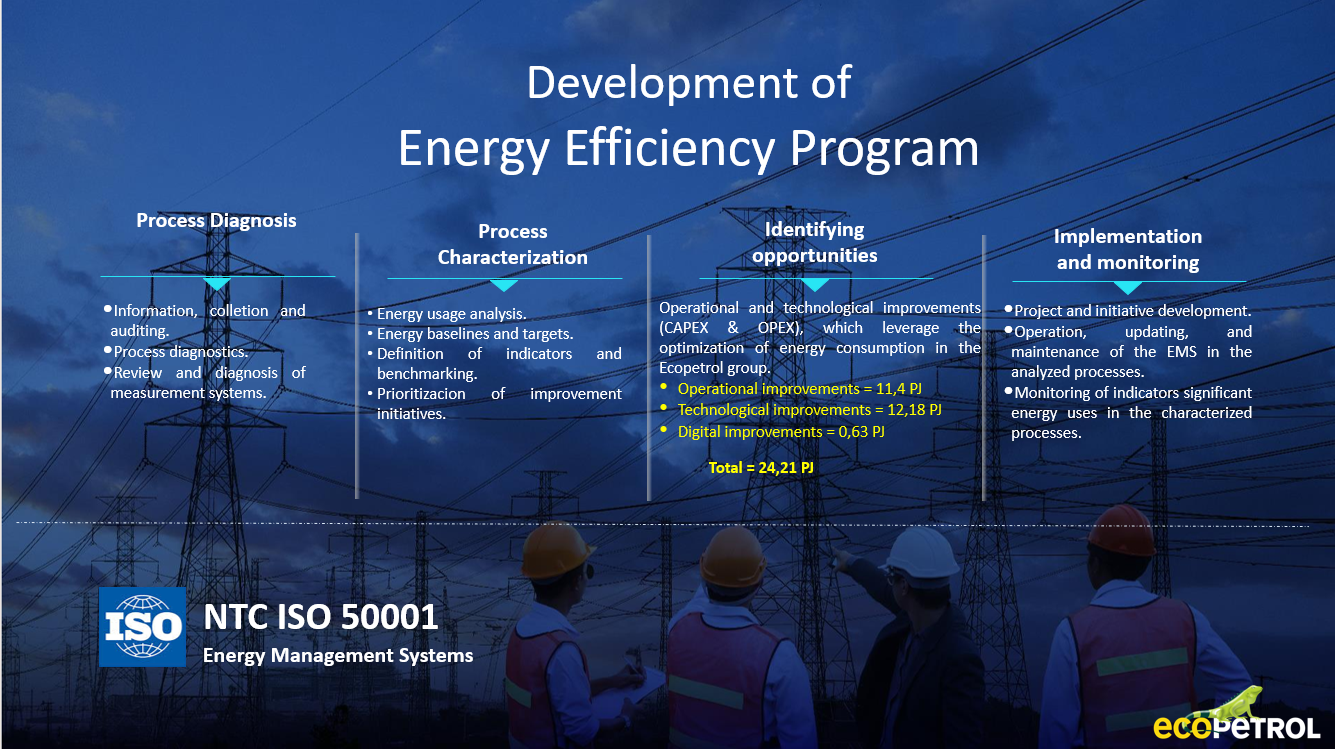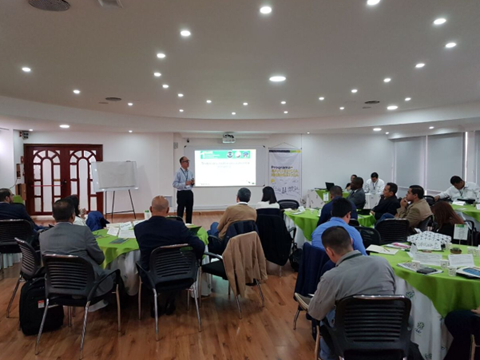 PautaInternasBarco
PautaInternasBarco
 buscador
buscador
 Gestión Energética
Gestión Energética
Energy Efficiency Strategy
Feb 9, 2025
Energy audits to identify opportunities for improving energy performance
Ecopetrol has incorporated an Energy Efficiency Strategy into its production processes under the guidelines of the international standard ISO 50001.
The strategy add value and maintain optimal energy performance in the operations and non-industrial facilities in Ecopetrol Group, in order to achieve this, several initiatives have been Identified, evaluated, and implemented based on conducted energy audits, resulting in:
- Diagnosis of energy measurement systems.
- Energy review of the company's production processes.
- Establishment of energy baseline and identification of potential energy savings.
- Identification, prioritization, and execution of energy efficiency measures in processes considered significant use of energy.
- Integration of the energy efficiency culture at all levels of the organization.
-
Quantified targets to address energy saving
Ecopetrol’s Energy Efficiency Strategy has set a target to reduce 25 PJ by 2030. This reduction represents 20% of its internal energy consumption and results in a mitigation of more than 1.2 MTonCO2e in emissions. These efforts are supported by investments and operational initiatives.



- Actions to reduce the amount of energy use
The Energy Efficiency Strategy has developed several initiatives that have resulted in a reduction of energy demand up to 3,5164 PJ, equivalent to a mitigation of 269,02 kTon CO₂e emissions as of 2025.
These optimizations were primarily achieved through monitoring, tracking, and controlling energy performance indicators in both transportation and refining. Additionally, we integrated technological improvements and digital tools with a significant impact on energy reduction in production and refining processes. Examples include deploying more efficient equipment (such as permanent magnet motors), leveraging nanotechnology on water disposal plants, and optimizing compression turbomachinery to reduce gas consumption at our Piedemonte facilities.

- Evaluation of progress in reducing energy consumption
Ecopetrol combines ISO 50001 and ISO 50006 standards to efficiently evaluate energy performance before and after implementing action plans. This approach leads to sustainable energy savings.
The process involves defining process or facilities energy baselines before implementing energy-saving measures and establishing energy performance indicators (EnPIs) to track progress, regular monitoring and evaluation of performance are conducted in accordance with ISO 50001 guidelines.
The company also utilizes the ISO 50006 standard to establish a robust energy baseline design and make necessary adjustments. This guide involves several key actions, including:
Recognizing External Factors: The company identifies external factors (such as weather conditions and production levels) that significantly impact energy consumption.
Adjusting Baselines Using Normalization Techniques: To account for variations, the company adjusts baselines using normalization. These techniques include weather normalization and production normalization.
Periodically Reviewing and Recalibrating Baselines: This ensures that the energy baselines remain accurate and relevant.
- Investments in innovation or R&D to decrease energy consumption
The Ecopetrol Group has invested, 12,7 million USD in innovation initiatives that directly or indirectly impact the energy efficiency of its processes.
The major challenges for the Ecopetrol Group associated with energy transition and climate change demand disruptive solutions and robust support in knowledge, technology, innovation, and human talent. These efforts aim to enhance the competitiveness of the traditional business, improve energy performance, optimize costs, and accelerate the decarbonization of our processes.
That is why the energy efficiency strategy aligns with global and corporate trends in technology and innovation. It is materialized through the implementation of digital energy management, nanotechnology, digital twins, bidirectional drilling processes, and other initiatives currently under evaluation and development. These efforts are developed with an environmentally responsible approach to resource management and value generation for all stakeholders involved in our operations.
- Energy efficiency training provided to employees to raise awareness of energy consumption reduction
Training sessions aim to involve employees at all levels of the company (strategic, tactical, and operational). This training plan has covered a total population of 9850 workers in 2024.
- Upstream and Downstream, the energy management training plan developed during the energy efficiency program has been supported by various training sessions offered by Ecopetrol University: Virtual course on energy efficiency (online platform), Fundamentals of energy efficiency, Operational control of energy performance, energy management for leaders, internal auditor training in ISO-50001:2018 Standard, and applied statistics for energy performance analysis.
- Midstream, training has focused on environmental sustainability, innovation-related topics, as well as participation in various forums and congresses focused on energy efficiency.
